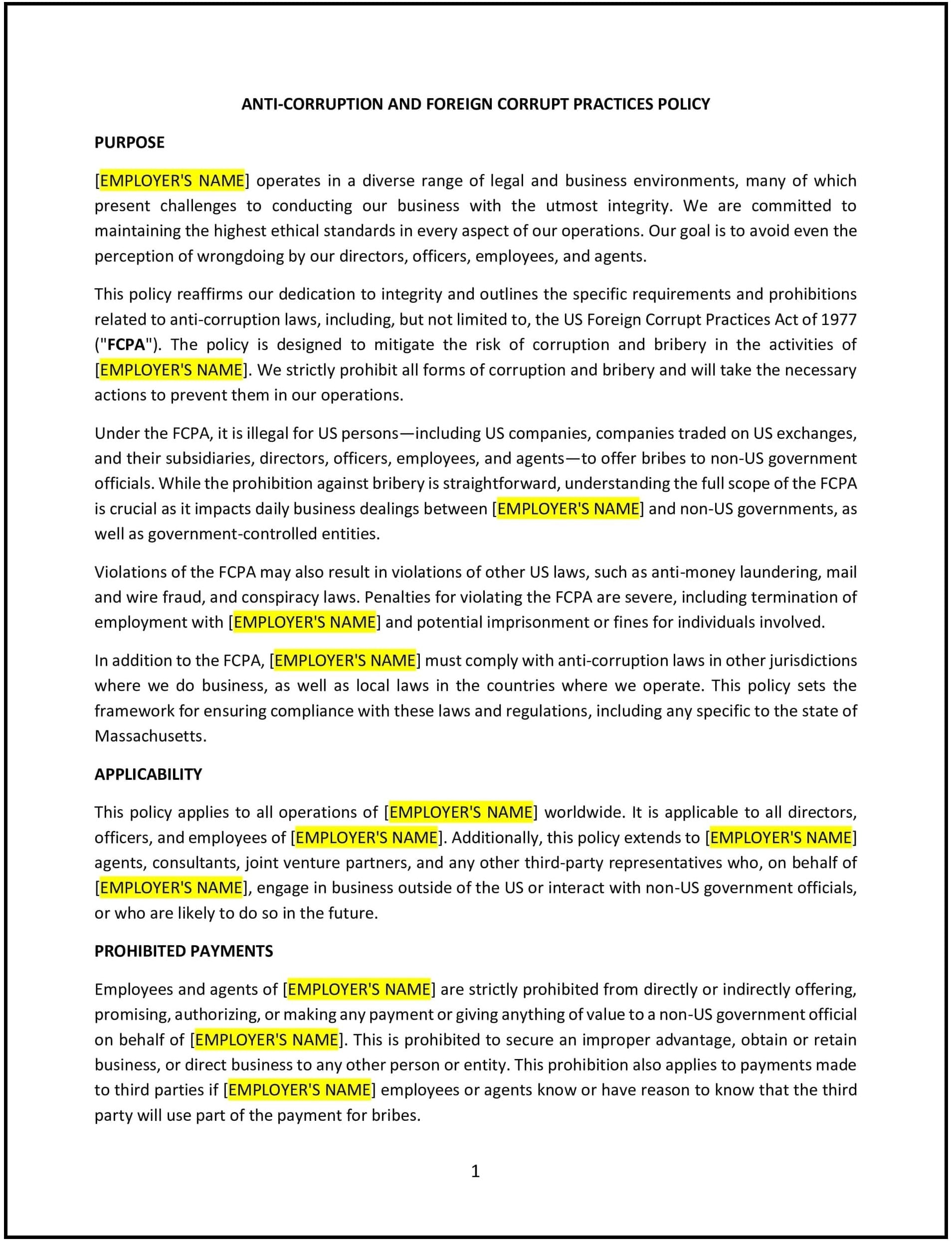Anti-corruption and foreign corrupt practices policy (Massachusetts): Free template
Got contracts to review? While you're here for policies, let Cobrief make contract review effortless—start your free review now.

Customize this template for free
This anti-corruption and foreign corrupt practices policy is designed to help Massachusetts businesses comply with applicable anti-corruption laws, including the U.S. Foreign Corrupt Practices Act (FCPA) and Massachusetts state laws. The policy outlines the company’s commitment to preventing bribery, corruption, and other unethical practices, both within the United States and abroad. It sets forth the company’s expectations for employees, contractors, and third-party agents regarding ethical conduct in business transactions and relationships.
By adopting this policy, businesses can promote ethical business practices, mitigate the risk of legal penalties, and improve compliance with international anti-corruption laws.
How to use this anti-corruption and foreign corrupt practices policy (Massachusetts)
- Define corruption and bribery: Clearly define what constitutes bribery, corruption, and unethical conduct. This includes offering or receiving bribes, kickbacks, or other improper payments, both directly or indirectly, to gain business advantages or favors.
- Establish a zero-tolerance policy: State that the company has a zero-tolerance policy for corruption and bribery, and that any such behavior is strictly prohibited. The policy should apply to employees, contractors, third-party agents, and other business associates.
- Set guidelines for gifts and entertainment: Specify the company’s policy on accepting or offering gifts, entertainment, and other business courtesies. The policy should limit the value of gifts or hospitality to avoid the appearance of impropriety, and set clear boundaries regarding what is acceptable.
- Implement reporting procedures: Provide a clear process for employees to report suspected corruption, bribery, or unethical practices. The policy should outline the reporting channels (e.g., HR, compliance officer, confidential hotline) and emphasize that employees can report concerns without fear of retaliation.
- Address third-party relationships: Outline the company’s expectations regarding third-party agents, contractors, or business partners, and specify the due diligence process for selecting third parties. The company should require third parties to comply with the same anti-corruption standards as employees.
- Promote training and awareness: Specify that all employees, managers, and relevant third-party partners must receive anti-corruption training. The policy should ensure that training is conducted regularly and that employees understand the risks and legal requirements of the policy.
- Set consequences for violations: Clearly state the potential consequences for employees or business partners found to be in violation of the policy. Consequences may include disciplinary action, termination of employment, or termination of business relationships, depending on the severity of the violation.
- Ensure compliance with laws: Emphasize that the company will comply with all relevant laws, including the FCPA, Massachusetts state laws, and any applicable international anti-corruption regulations. The policy should explain that all employees are responsible for understanding and adhering to these legal requirements.
Benefits of using this anti-corruption and foreign corrupt practices policy (Massachusetts)
This policy offers several benefits for Massachusetts businesses:
- Reduces legal and financial risks: By enhancing compliance with anti-corruption laws, businesses can reduce the risk of fines, penalties, and reputational damage resulting from illegal or unethical business practices.
- Promotes ethical business conduct: A clear anti-corruption policy sets the tone for ethical behavior within the company, encouraging employees and partners to uphold high standards of integrity.
- Protects the company’s reputation: By adhering to ethical practices and preventing corruption, businesses can safeguard their reputation with clients, customers, investors, and regulators.
- Enhances transparency: The policy ensures that business operations are conducted transparently, promoting trust and accountability in the company’s dealings with employees, customers, and stakeholders.
- Strengthens business relationships: By requiring business partners to adhere to the same anti-corruption standards, the policy promotes stronger, more reliable relationships with third parties and ensures that partnerships are built on ethical practices.
- Increases employee trust and morale: Employees are more likely to feel confident and motivated when they work for a company that demonstrates a commitment to integrity and ethical behavior.
Tips for using this anti-corruption and foreign corrupt practices policy (Massachusetts)
- Communicate the policy clearly: Ensure that all employees and relevant third-party partners are aware of the anti-corruption policy, including the company’s expectations, reporting channels, and the consequences of violating the policy.
- Conduct regular training: Provide regular anti-corruption training to employees, particularly those in sales, procurement, or other roles where they may interact with third parties or government officials. Ensure that training includes real-world examples and practical guidance on recognizing and avoiding corruption.
- Monitor compliance: Regularly audit business transactions, third-party contracts, and other relevant activities to ensure compliance with the policy. Consider using compliance software or conducting periodic risk assessments to identify potential areas of concern.
- Establish strong due diligence processes: Implement a robust due diligence process when selecting third-party agents, contractors, or business partners. Ensure that they are thoroughly vetted and comply with anti-corruption standards.
- Create a culture of ethics: Foster a culture of ethics and integrity within the organization by promoting transparency, open communication, and accountability at all levels of the company.
- Review and update regularly: Regularly review and update the policy to ensure it remains compliant with Massachusetts state laws, federal regulations, and international anti-corruption standards. Adjust the policy as necessary to address emerging risks or changes in business practices.